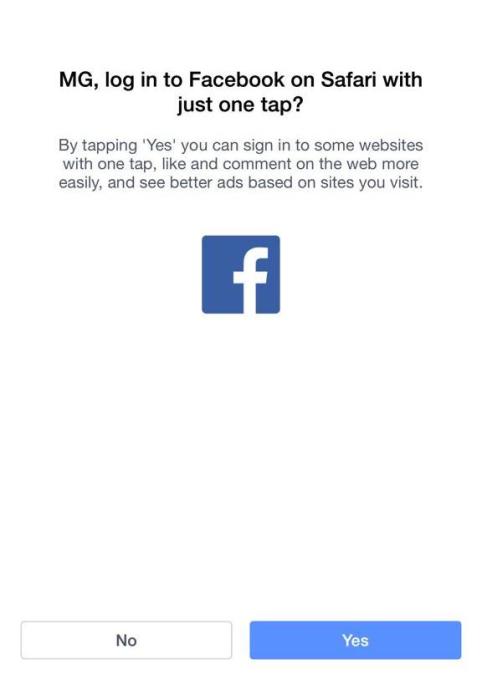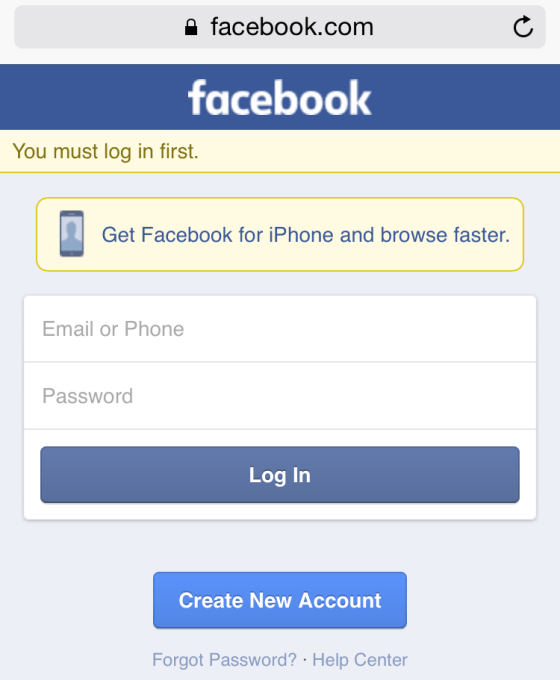35 million people run into a Facebook email and password login roadblock on iOS each day, and over half of them bounce. That’s why Facebook confirms to me that it’s testing a new tool that lets users log in to Facebook on Safari with one tap, rather than having to type in their credentials — which most don’t. It could ease frustrations for users while boosting Facebook’s ad tracking.
 Former TechCrunch writer MG Siegler spotted the test, and Facebook responded with details after I inquired.
Former TechCrunch writer MG Siegler spotted the test, and Facebook responded with details after I inquired.
Users in the test who click external links inside Facebook’s iOS app will be directed to Safari rather than Facebook’s internal browser. Before seeing the site, though, Facebook shows them an interstitial screen begging them to hit a button and instantly log into Facebook on Safari.
The prompt explains that “By tapping ‘Yes’ you can sign in to some websites with one tap, like and comment on the web more easily, and see better ads based on the sites you visit.”
Essentially, Facebook’s OS-level single sign-on allows for instant logins in native apps, but it doesn’t extend to sites inside Safari. Normally you’d have to go through the chore of logging in with your email and password, and possibly have to complete a two-factor authentication. Facebook’s new trick fixes that by slyly passing a login token from its main app into Safari.
So when exactly would this help? Here are a few examples:
 If you’ve ever gotten a Facebook Event link in your email or calendar and tried to open it on an iPhone, you probably loaded that URL in Safari. But when you arrived, you’d annoyingly be asked to log in. Auto-logged in, you’ll immediately see that Event, post or whatever else inside of Facebook.
If you’ve ever gotten a Facebook Event link in your email or calendar and tried to open it on an iPhone, you probably loaded that URL in Safari. But when you arrived, you’d annoyingly be asked to log in. Auto-logged in, you’ll immediately see that Event, post or whatever else inside of Facebook.
If you visit a news site on Safari and try to use the Like button to share it, or use Facebook’s commenting widget, you might similarly hit the login roadblock. Instead, you’d instantly be able to share or comment.
If you’ve ever needed to use a website with a Facebook login option like UPS, you’d have to do that manually. With this test, you’d skip the login and go straight to the data permissions.
Those are all nice for users and could boost engagement with Facebook’s content, widgets, and connected web apps. But the real benefit for Facebook is that if you’re logged in on Safari, it can collect information about what websites you visit there.
Visits to sites with some Facebook Connect or ad network integration by signed-in users generate a log of the visit for Facebook. It can use this improve the targeting of ads on its own app based on where you surf. Browse shopping sites, and you could see ads for their products back on the social network.
And that’s why Facebook and Google have such a big advantage. Mobile phones don’t collect traditional browser cookies like desktop computers. But both of these tech giants get users to log in so they know where they surf, even without cookies. And that’s allowing them to dominate mobile ads.
